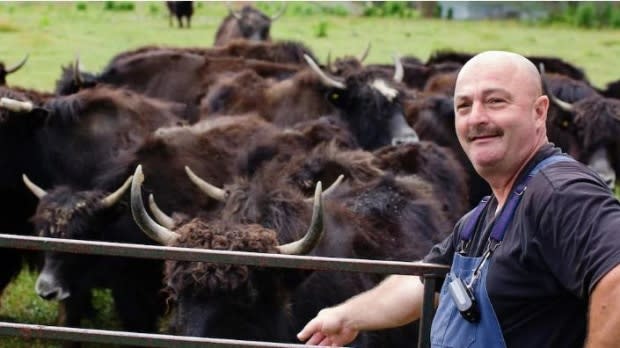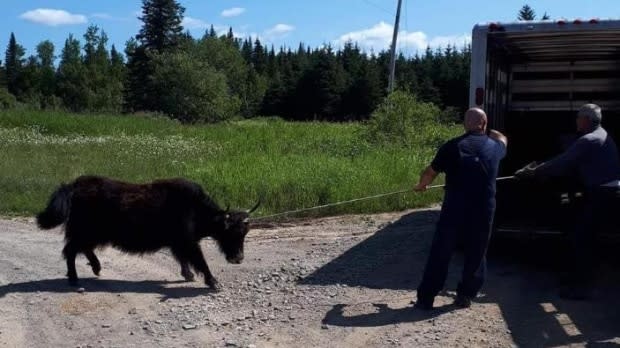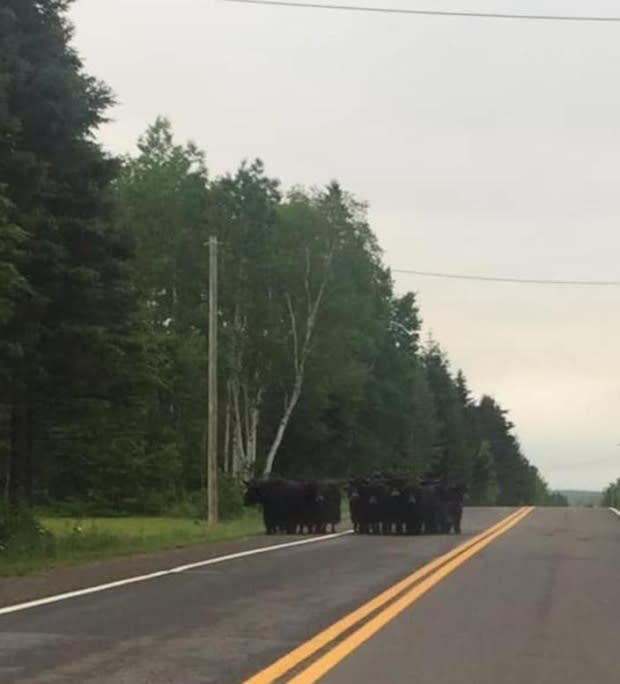Gaspé farmer still trying to get his missing yaks back
On the eve of his retirement, a farmer in the Gaspé awoke to discover that something worth more than $120,000 had escaped his property, wandered into the forest, and got lost — in the form of his herd of 60 Tibetan yaks.
The animals escaped from Jean-Guy Duchesne's farm overnight, leaving behind a broken picket fence and a mass of twisted wire.
"Your heartbeat is just accelerating," recounted Duchesne, who has been raising yaks for meat at his farm Bos G, in Saint-Elzéar, for 17 years.
Duchesne tracked the yaks' prints and feces, and found the beasts were walking away from the farm and into the forest, having split into five or six smaller herds.
"The first instinct they have is to climb," he said.
The bolted bovines trekked 25 kilometres in the first day, but many made it 45 kilometres away from home.

Duchesne went from a yak farmer to a yak wrangler, deciding to track and capture each one individually, a feat that has taken more than two months, and with four animals still missing.
The difficulty, he said, is getting the wayward yaks out of the dense forest and into a place where they can be trapped and transported back to the farm.
Unexpected help from the community
More than 30 volunteers have been helping with the search, each day reporting yak sightings and helping to track their movements.
Every catch attempt is unique: some of the animals have been surrounded with temporary enclosures, others baited into trailers with grain, and some have been lassoed.
"Within our group of volunteers, we have a sub-group called 'the cowboys,'" Duchesne said. "They really have the life experience to properly handle a lasso."

The team has to decide on the spot how to trap the animal, depending on where it is, and whether it is calm or agitated, in which case there is a risk it gets aggressive.
Farmer hoping hunters can help with the search
After the initial disappearance, Duchesne alerted police and wildlife officials, but otherwise kept the mass yak escape a secret, because he didn't want mobs of people descending on the small town, possibly scaring the animals.
While the average adult male yak weighs about 680 kilograms and is crowned with long horns, they are considered domesticated and not a public safety risk.
"We wanted to protect the animals first, so we waited," he said.
But word eventually spread on social media when people started spotting the herd in unexpected places.

Now, Duchesne said the start of hunting season means he could get some extra eyes on the four remaining wayward animals.
They do know where the other four are, but they aren't accessible by trailer, and the track and trap team is waiting for the best time to pick them up.
"We're still looking all the time," said Duchesne, adding they start tracking as soon as the sun comes up.
With a minimum cost of $2,000 a head, and the loss not covered by insurance, Duchesne is determined to find them all.
He said the abundance of pasture, forest, and water sources means the yaks are likely living well.
"Let's say their bellies are full," he said.
Once winter hits, he's confident they'll be driven home by the snow and food scarcity.
Duchesne still planning to retire
Duchesne and his partner started the farm because they thought it would be a fun new venture, and decided on yaks after extensive research.
"You can do a lot of things with yak," he said — like making cheese, selling the milk, and harvesting the wool. "Even the poop can be usable."
Duchesne has focused on selling the meat.
The farmer said he still believes in the quality of his fencing, and that nothing like this has ever happened before.
"Never, never in 17 years," he said. "This is really bad luck."

Despite the summer adventure, Duchesne is still looking to retire.
Thirty of his yaks are destined for a farm in Bolton, in the Eastern Townships, and Duchesne is still looking for buyers for the others.
"We did quite well in 17 years, but it's time to move on," he said.
In the meantime, his retirement is delayed while he concentrates on rounding up the last four yaks.

